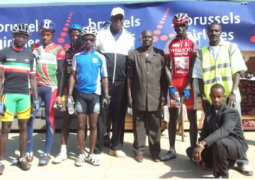In less than three weeks’ time, Muslims in The Gambia will join the rest of the Islamic Ummah in observing the holy month of Ramadan.
As we always note on these pages, especially at this time, one thing that is of concern during Ramadan is that business people tend to increase the prices of basic commodities, especially of sugar.
It is our view that though businesses are run to make a profit, business people should not use the month to exploit the poor and needy.
Commodities should be made not only available, but affordable to the average Gambian.
Our other concern here is that, during this month, family heads engage in unnecessary expenditure, especially on food, most of which usually ends up in dustbins.
They cook more than they can consume, and at the end of the day throw away leftovers whose costs are incalculable.
This is bad, and people should try and put a stop to the wasteful practice.
To demand for more expenditure on expensive foodstuffs, just because friends or neighbours are doing so, is ridiculous!
People who engage in such practice often do not understand the economic condition of their families, and it is imperative for such people to know that “it is good to cut one’s clothes according to one’s size”.
People should always appreciate what they have, and not look at what others have.
Indeed, as Muslims, we should engage in good deeds during this month of Ramadan, and strive to maintain this forever, despite life’s endless temptations.
Ramadan is a month that can transform people, and make them more God-fearing in all their dealings.
We should bear in mind that Allah is with us throughout and everywhere.
People should also be mindful of pick-pocketing, when they go out shopping, as thieves capitalize on the occasion, even though it is Ramadan.
This period of month-long fasting and religious piety will be followed by the festive occasion of the Id ul fitr, which marks the end of Ramadan.
We pray, in advance, that Allah may give us the strength, faith and means to go through the Ramadan without difficulties, and live to witness the feast of Koriteh, a day for congregational prayers, for get-togethers, for visiting friends, family members and loved ones.
While many use the occasion to supplicate for Allah’s forgiveness, pray for each other, as well as the dead, some use Ramadan as a time to forgive each other, as well as renew their friendship.
“He deserves Paradise who makes his companions laugh.”
Quran
As we always note on these pages, especially at this time, one thing that is of concern during Ramadan is that business people tend to increase the prices of basic commodities, especially of sugar.
It is our view that though businesses are run to make a profit, business people should not use the month to exploit the poor and needy.
Commodities should be made not only available, but affordable to the average Gambian.
Our other concern here is that, during this month, family heads engage in unnecessary expenditure, especially on food, most of which usually ends up in dustbins.
They cook more than they can consume, and at the end of the day throw away leftovers whose costs are incalculable.
This is bad, and people should try and put a stop to the wasteful practice.
To demand for more expenditure on expensive foodstuffs, just because friends or neighbours are doing so, is ridiculous!
People who engage in such practice often do not understand the economic condition of their families, and it is imperative for such people to know that “it is good to cut one’s clothes according to one’s size”.
People should always appreciate what they have, and not look at what others have.
Indeed, as Muslims, we should engage in good deeds during this month of Ramadan, and strive to maintain this forever, despite life’s endless temptations.
Ramadan is a month that can transform people, and make them more God-fearing in all their dealings.
We should bear in mind that Allah is with us throughout and everywhere.
People should also be mindful of pick-pocketing, when they go out shopping, as thieves capitalize on the occasion, even though it is Ramadan.
This period of month-long fasting and religious piety will be followed by the festive occasion of the Id ul fitr, which marks the end of Ramadan.
We pray, in advance, that Allah may give us the strength, faith and means to go through the Ramadan without difficulties, and live to witness the feast of Koriteh, a day for congregational prayers, for get-togethers, for visiting friends, family members and loved ones.
While many use the occasion to supplicate for Allah’s forgiveness, pray for each other, as well as the dead, some use Ramadan as a time to forgive each other, as well as renew their friendship.
“He deserves Paradise who makes his companions laugh.”
Quran
Read Other Articles In Article (Archive)



